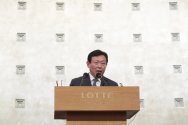Huawei says 2022 'most challenging' time for device business
Huawei Technologies on Friday said its device business, which includes smartphones and other consumer electronics, is facing its "most challenging" time ever this year as the company continues to wrestle with a U.S. clampdown and economic uncertainties.
The Chinese tech company's revenue for the first half of 2022 dropped 5.9% on the year to 301.6 billion yuan ($44.8 billion), while its net profit margin declined to 5% from 9.8% a year ago, Huawei said in a brief press statement on Friday.
"2022 will probably be the most challenging year historically for our devices business," the company said, explaining that the segment was hit hard by COVID-19 and the global economic downturn. "As our smartphone business has been heavily impacted, in the device business, we have decided to focus on developing innovative products in five major user scenarios: smart office, fitness and health, smart home, easy travel, and entertainment."
Huawei, once the world's largest smartphone maker, has been cut off from supplies of cutting-edge chips since the U.S. added it to a trade blacklist. It also lost the ability to work with industry-leading chipmakers such as Taiwan Semiconductor Manufacturing Co. and Samsung Electronics due to the U.S. ban.
The Chinese company has been attempting to build its own chipmaking abilities, but acknowledged in a comment to Nikkei Asia that the road ahead will be a long one.
"Previously, the semiconductor industry was a globalized industry and each player played a key role in making chips possible. It did not make sense and there was no commercial value in repeating other people's investments," a company spokesperson said. "However, now that the market has become segmented and access to certain technologies are blocked, certain investments have now become logical."
The company will continue innovating alongside its partners to advance "the common goal of development for China's semiconductor industry," the person said.
Huawei did not specify which areas it is focusing on for investment, but has previously poured money into all kinds of chip-related technologies including materials, precision tools and chip design software, Nikkei Asia reported earlier.
The declining net profit margin in the first half of this year was due to the shrinking scale of its business and continued aggressive investment in new businesses, software technologies and efforts to ensure business continuity, the spokesperson said. Huawei is also continuing to increase its research and development spending.
Sales from its carrier business, which contributed 47% of Huawei's total revenues, and its devices business group, which includes smartphones, all shrank from the same time a year ago. Enterprise business sales grew 27.5% on the year.
Overall, Huawei's 5G-related telecom equipment business has shown steady growth both in the Chinese market or in overseas markets, according to the company. It has accumulated more than 5,000 commercial 5G contracts in its home market, Hungary, Thailand, South Africa, Saudi Arabia and the United Arab Emirates, to help companies build 5G infrastructure. Huawei 5G technologies have been used in ports, mines, manufacturing, oil and gas industries, it said.
The company's cloud computing service business has maintained good growth, mainly from the massive domestic market.
Around 80% of China's top 50 internet companies are Huawei's cloud service clients, and it has 220 financial clients, 30 automobile clients, and more than 40 industrial internet customers. More than 23,000 manufacturers use the services, it said.
Huawei is also expanding its foray into the automotive business, though it has yet to turn a profit in this segment. The company will focus on providing key components and automotive software, and its consumer electronics team will help clients design the exteriors and interiors of automobiles, it said.
Huawei is expected to invest $1.5 billion in research and development on automotive-related technologies, 50% more than last year. It has devoted some 7,000 members of its R&D workforce to building car technologies, including electronics infrastructure, smart cockpits and smart driving assistance tech.
Non paywall:
Huawei Technologies on Friday said its device business, which includes smartphones and other consumer electronics, is facing its "most challenging" time ever this year as the company continues to wrestle with a U.S. clampdown and economic uncertainties.
The Chinese tech company's revenue for the first half of 2022 dropped 5.9% on the year to 301.6 billion yuan ($44.8 billion), while its net profit margin declined to 5% from 9.8% a year ago, Huawei said in a brief press statement on Friday.
"2022 will probably be the most challenging year historically for our devices business," the company said, explaining that the segment was hit hard by COVID-19 and the global economic downturn. "As our smartphone business has been heavily impacted, in the device business, we have decided to focus on developing innovative products in five major user scenarios: smart office, fitness and health, smart home, easy travel, and entertainment."
Huawei, once the world's largest smartphone maker, has been cut off from supplies of cutting-edge chips since the U.S. added it to a trade blacklist. It also lost the ability to work with industry-leading chipmakers such as Taiwan Semiconductor Manufacturing Co. and Samsung Electronics due to the U.S. ban.
The Chinese company has been attempting to build its own chipmaking abilities, but acknowledged in a comment to Nikkei Asia that the road ahead will be a long one.
"Previously, the semiconductor industry was a globalized industry and each player played a key role in making chips possible. It did not make sense and there was no commercial value in repeating other people's investments," a company spokesperson said. "However, now that the market has become segmented and access to certain technologies are blocked, certain investments have now become logical."
The company will continue innovating alongside its partners to advance "the common goal of development for China's semiconductor industry," the person said.
Huawei did not specify which areas it is focusing on for investment, but has previously poured money into all kinds of chip-related technologies including materials, precision tools and chip design software, Nikkei Asia reported earlier.
The declining net profit margin in the first half of this year was due to the shrinking scale of its business and continued aggressive investment in new businesses, software technologies and efforts to ensure business continuity, the spokesperson said. Huawei is also continuing to increase its research and development spending.
Sales from its carrier business, which contributed 47% of Huawei's total revenues, and its devices business group, which includes smartphones, all shrank from the same time a year ago. Enterprise business sales grew 27.5% on the year.
Overall, Huawei's 5G-related telecom equipment business has shown steady growth both in the Chinese market or in overseas markets, according to the company. It has accumulated more than 5,000 commercial 5G contracts in its home market, Hungary, Thailand, South Africa, Saudi Arabia and the United Arab Emirates, to help companies build 5G infrastructure. Huawei 5G technologies have been used in ports, mines, manufacturing, oil and gas industries, it said.
The company's cloud computing service business has maintained good growth, mainly from the massive domestic market.
Around 80% of China's top 50 internet companies are Huawei's cloud service clients, and it has 220 financial clients, 30 automobile clients, and more than 40 industrial internet customers. More than 23,000 manufacturers use the services, it said.
Huawei is also expanding its foray into the automotive business, though it has yet to turn a profit in this segment. The company will focus on providing key components and automotive software, and its consumer electronics team will help clients design the exteriors and interiors of automobiles, it said.
Huawei is expected to invest $1.5 billion in research and development on automotive-related technologies, 50% more than last year. It has devoted some 7,000 members of its R&D workforce to building car technologies, including electronics infrastructure, smart cockpits and smart driving assistance tech.
Non paywall:











